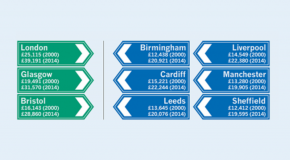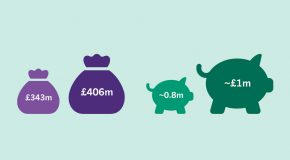Budget 2016: The UK urgently needs a low-carbon plan
Related content

Resetting the agenda: How ESG is shaping our future
The Covid-19 pandemic has exposed a wealth of interconnections – between ecological and human wellbeing, between economic and environmental fragility, between social inequality and health outcomes, and more. The consequences of these connections are now filtering through, reshaping our society and economy.
In this setting, the need to integrate environmental, social and governance (ESG) factors when investing has become even more critical. Institutional investors must employ ESG not just to mitigate risks and identify opportunities, but to engage with companies to bring about the positive change needed to drive a sustainable economic recovery in the post-Covid world.
In order to understand how ESG could be both a new performance marker and a growth driver in this environment, as well as how institutional investors are using ESG to make investment decisions and to assess their own performance, The Economist Intelligence Unit (EIU), sponsored by UBS, surveyed 450 institutional investors working in asset and wealth management firms, corporate pension funds, endowment funds, family offices, government agencies, hedge funds, insurance companies, pension funds, sovereign wealth funds and reinsurers in North America, Europe and Asia-Pacific.
Download the report and infographic to learn more.

Charting the course for ocean sustainability in the Indian Ocean Rim
Charting the course for ocean sustainability in the Indian Ocean Rim is an Economist Intelligence Unit report, sponsored by Environment Agency Abu Dhabi and the Department of Economic Development Abu Dhabi, which highlights key ocean challenges facing the Indian Ocean Rim countries and showcases initiatives undertaken by governments and the private sector in the region to address these challenges.
Click here to view the report.

Fixing Asia's food system
The urgency for change in Asia's food system comes largely from the fact that Asian populations are growing, urbanising and changing food tastes too quickly for many of the regions’ food systems to cope with. Asian cities are dense and are expected to expand by 578m people by 2030. China, Indonesia and India will account for three quarters of these new urban dwellers.
To study what are the biggest challenges for change, The Economist Intelligence Unit (EIU) surveyed 400 business leaders in Asia’s food industry. According to the respondents, 90% are concerned about their local food system’s ability to meet food security needs, but only 32% feel their organisations have the ability to determine the success of their food systems. Within this gap is a shifting balance of responsibility between the public and private sectors, a tension that needs to and can be strategically addressed.
Vibrant Economy
This series of blog posts and infographics, sponsored by Grant Thorton, seeks to explore how a vibrant economy can be scoped, shaped and developed in the UK.
With insights from leading experts across the UK's businesses, cities and public and third sector organisations, this series aims to stimulate ideas and actions that can create a vibrant economy – one which realises the shared potential of companies, cities, people and communities across the UK.
BLOG POSTS:
More from this series

blog
The network paradigm and the city
The future viability, resilience and success of cities and communities at large will increasingly depend on a given city

blog
Open for business?
As in medicine, so in public policy: First, do no harm. Why then are policymakers in the UK—one of the world's most

blog
Disrupting Finance: The P2P view
As far as millions of consumers and businesses are concerned, peer-to-peer (P2P) has transformed the way we share our

blog
Devolution and the future of public services
The public services of the future will be shaped by the UK Government’s decision to devolve powers to a more local

blog
Inequality and the future of work
Does inequality matter? In the rich OECD economies, including the UK, the inequality of income and of wealth has been

blog
Investing in future skills
Despite an uncertain international outlook, the UK economy is consolidating a strong recovery and creating record

blog
Recruitment and retention: A driver for transforming corporate culture?
The immediate aftermath of the 2008 global financial crisis (GFC) was ironically a time of hope for many of us who saw

blog
Financing the UK’s infrastructure: private and public gains
Over the past 20 years concessions in the form of private finance initiatives (PFIs) and public-private partnerships (

infographic
Trust in Britain's businesses
Trust in markets supports impacts on competition and innovation. This infographic looks at some of the drivers of trust

infographic
Trends that will disrupt the UK business environment
What does the business environment look like in the future? And how is the global and UK business environment changing

infographic
As the UK ages the cost of disease will increase
What are the challenges ahead for our health services? This infographic will explore how demographic trends, namely an

infographic
The future of urban Britain
What will the British urban landscape of 2035 resemble? This infographic will explore the expected changes in the

infographic
Major investment needed in UK infrastructure
What are the UK‘s infrastructure needs in order to support economic growth while achieving environmental goals. This

infographic
Balancing the skills equation
What skills do we need to unlock growth and for business and people to thrive in the future? And how can they be taught

infographic
Trust and change in capital markets
This infographic illustrates the developments in the Financial Services sector, including the advancement of financial
Related content

The Hinrich Foundation Sustainable Trade Index 2018
Yet the enthusiasm in Asia for trade does not appear to have waned. This broad societal consensus behind international trade has enabled Asian countries to continue broadening and deepening existing trading relationships, for example, by quickly hammering out a deal for the Comprehensive and Progressive Agreement for Trans-Pacific Partnership (CPTPP) in early 2018 following the US’s withdrawal from its predecessor in 2017.
Asia, then, finds itself in the unique position of helping lead and sustain the global economy’s commitment to free and fair trade. It is in this context that the need for sustainability in trade is ever more crucial.
The Hinrich Foundation Sustainable Trade Index was created for the purpose of stimulating meaningful discussion of the full range of considerations that policymakers, business executives, and civil society leaders must take into account when managing and advancing international trade.
The index was commissioned by the Hinrich Foundation, a non-profit organisation focused on promoting sustainable trade. This, the second edition of the study, seeks to measure the capacity of 20 economies—19 in Asia along with the US—to participate in the international trading system in a manner that supports the long-term domestic and global goals of economic growth, environmental protection, and strengthened social capital. The index’s key findings include:
Countries in Asia, especially the richer ones, have broadly regressed in terms of trade sustainability. Hong Kong is developed Asia’s bright spot, recording a slight increase in its score and topping the 2018 index. Several middle-income countries perform admirably, led by Sri Lanka. For the economic pillar, countries generally performed well in terms of growing their labour forces as well as their per-head GDPs. For the social pillar, sharp drops for some countries in certain social pillar indicators contribute to an overall decline. For the environmental pillar, with deteriorating environmental sustainability in many rich countries, China, Laos and Pakistan are the only countries to record increases in scores. Sustainability is an ever more important determinant of FDI and vendor selection in choosing supply-chain partners. Companies are improving the sustainability of their supply chains by restructuring and broadening relationships with competitors and vendors.
The Global Illicit Trade Environment Index 2018
To measure how nations are addressing the issue of illicit trade, the Transnational Alliance to Combat Illicit Trade (TRACIT) has commissioned The Economist Intelligence Unit to produce the Global Illicit Trade Environment Index, which evaluates 84 economies around the world on their structural capability to protect against illicit trade. The global index expands upon an Asia-specific version originally created by The Economist Intelligence Unit in 2016 to score 17 economies in Asia.
View the Interactive Index >> Download workbook

Breaking Barriers: Agricultural trade between GCC and Latin America
The GCC-LAC agricultural trading relationship has thus far been dominated by the GCC’s reliance on food imports, specifically meat, sugar, and cereals. Over the past two years, however, there has been a notable decline in the share of sugar imported from LAC, and 2017 saw the biggest importers in the GCC—Saudi Arabia and the UAE—impose a ban on Brazilian meat.
Market players on both sides of the aisle are keen to grow the relationship further, but there are hurdles to overcome. In this report, we explore in greater depth the challenges that agricultural exporters and importers in LAC and the GCC face. We consider both tariff and non-tariff barriers and assess key facets of the trading relationship including transport links, customs and certification, market information, and trade finance.
Key findings of the report:
GCC will need to continue to build partnerships to ensure a secure supply of food. Concerns over food security have meant that the GCC countries are exploring ways to produce more food locally. However, given the region’s climate and geology, food imports will remain an important component of the food supply. Strengthening partnerships with key partners such as those in LAC, from which it sourced 9% of its total agricultural imports in 2016, will be vital to food security in the region.
There is a wider range of products that the LAC countries can offer the GCC beyond meat, sugar and cereals. Providing more direct air links and driving efficiencies in shipping can reduce the time and cost of transporting food products. This will, in turn, create opportunities for LAC exporters to supply agricultural goods with a shorter shelf life or those that are currently too expensive to transport. Exporters cite examples such as berries and avocados.
The GCC can engage small and medium-sized producers that dominate the LAC agricultural sector by offering better trade financing options and connectivity. More direct air and sea links can reduce the cost of transporting food products, making it viable for smaller players to participate in agricultural trade. The existing trade financing options make it prohibitive for small and medium-sized players too. Exporters in LAC suggest that local governments and private companies in the GCC can offer distribution services with immediate payments to smaller suppliers at a discount.
Blockchain technology is poised to address key challenges market players face in agricultural trade. Through a combination of smart contracts and data captured through devices, blockchain technology can help to reduce paperwork, processing times and human error in import and export processes. It can improve transparency, as stakeholders can receive information on the state of goods and status of shipments in real time. Finally, it can help with food safety and quality management—monitoring humidity and temperature, for instance, along the supply chain can help to pinpoint batches that may be contaminated, minimising the need for a blanket ban on a product.
Are You Playing Climate Change Defence or Offence after Paris COP21?
Related content

Resetting the agenda: How ESG is shaping our future
The Covid-19 pandemic has exposed a wealth of interconnections – between ecological and human wellbeing, between economic and environmental fragility, between social inequality and health outcomes, and more. The consequences of these connections are now filtering through, reshaping our society and economy.
In this setting, the need to integrate environmental, social and governance (ESG) factors when investing has become even more critical. Institutional investors must employ ESG not just to mitigate risks and identify opportunities, but to engage with companies to bring about the positive change needed to drive a sustainable economic recovery in the post-Covid world.
In order to understand how ESG could be both a new performance marker and a growth driver in this environment, as well as how institutional investors are using ESG to make investment decisions and to assess their own performance, The Economist Intelligence Unit (EIU), sponsored by UBS, surveyed 450 institutional investors working in asset and wealth management firms, corporate pension funds, endowment funds, family offices, government agencies, hedge funds, insurance companies, pension funds, sovereign wealth funds and reinsurers in North America, Europe and Asia-Pacific.
Download the report and infographic to learn more.

Charting the course for ocean sustainability in the Indian Ocean Rim
Charting the course for ocean sustainability in the Indian Ocean Rim is an Economist Intelligence Unit report, sponsored by Environment Agency Abu Dhabi and the Department of Economic Development Abu Dhabi, which highlights key ocean challenges facing the Indian Ocean Rim countries and showcases initiatives undertaken by governments and the private sector in the region to address these challenges.
Click here to view the report.

Fixing Asia's food system
The urgency for change in Asia's food system comes largely from the fact that Asian populations are growing, urbanising and changing food tastes too quickly for many of the regions’ food systems to cope with. Asian cities are dense and are expected to expand by 578m people by 2030. China, Indonesia and India will account for three quarters of these new urban dwellers.
To study what are the biggest challenges for change, The Economist Intelligence Unit (EIU) surveyed 400 business leaders in Asia’s food industry. According to the respondents, 90% are concerned about their local food system’s ability to meet food security needs, but only 32% feel their organisations have the ability to determine the success of their food systems. Within this gap is a shifting balance of responsibility between the public and private sectors, a tension that needs to and can be strategically addressed.
Water security poses a significant threat to business
Related content

Resetting the agenda: How ESG is shaping our future
The Covid-19 pandemic has exposed a wealth of interconnections – between ecological and human wellbeing, between economic and environmental fragility, between social inequality and health outcomes, and more. The consequences of these connections are now filtering through, reshaping our society and economy.
In this setting, the need to integrate environmental, social and governance (ESG) factors when investing has become even more critical. Institutional investors must employ ESG not just to mitigate risks and identify opportunities, but to engage with companies to bring about the positive change needed to drive a sustainable economic recovery in the post-Covid world.
In order to understand how ESG could be both a new performance marker and a growth driver in this environment, as well as how institutional investors are using ESG to make investment decisions and to assess their own performance, The Economist Intelligence Unit (EIU), sponsored by UBS, surveyed 450 institutional investors working in asset and wealth management firms, corporate pension funds, endowment funds, family offices, government agencies, hedge funds, insurance companies, pension funds, sovereign wealth funds and reinsurers in North America, Europe and Asia-Pacific.
Download the report and infographic to learn more.

Charting the course for ocean sustainability in the Indian Ocean Rim
Charting the course for ocean sustainability in the Indian Ocean Rim is an Economist Intelligence Unit report, sponsored by Environment Agency Abu Dhabi and the Department of Economic Development Abu Dhabi, which highlights key ocean challenges facing the Indian Ocean Rim countries and showcases initiatives undertaken by governments and the private sector in the region to address these challenges.
Click here to view the report.

Fixing Asia's food system
The urgency for change in Asia's food system comes largely from the fact that Asian populations are growing, urbanising and changing food tastes too quickly for many of the regions’ food systems to cope with. Asian cities are dense and are expected to expand by 578m people by 2030. China, Indonesia and India will account for three quarters of these new urban dwellers.
To study what are the biggest challenges for change, The Economist Intelligence Unit (EIU) surveyed 400 business leaders in Asia’s food industry. According to the respondents, 90% are concerned about their local food system’s ability to meet food security needs, but only 32% feel their organisations have the ability to determine the success of their food systems. Within this gap is a shifting balance of responsibility between the public and private sectors, a tension that needs to and can be strategically addressed.
What the Paris Agreement means for the private sector
Related content

Resetting the agenda: How ESG is shaping our future
The Covid-19 pandemic has exposed a wealth of interconnections – between ecological and human wellbeing, between economic and environmental fragility, between social inequality and health outcomes, and more. The consequences of these connections are now filtering through, reshaping our society and economy.
In this setting, the need to integrate environmental, social and governance (ESG) factors when investing has become even more critical. Institutional investors must employ ESG not just to mitigate risks and identify opportunities, but to engage with companies to bring about the positive change needed to drive a sustainable economic recovery in the post-Covid world.
In order to understand how ESG could be both a new performance marker and a growth driver in this environment, as well as how institutional investors are using ESG to make investment decisions and to assess their own performance, The Economist Intelligence Unit (EIU), sponsored by UBS, surveyed 450 institutional investors working in asset and wealth management firms, corporate pension funds, endowment funds, family offices, government agencies, hedge funds, insurance companies, pension funds, sovereign wealth funds and reinsurers in North America, Europe and Asia-Pacific.
Download the report and infographic to learn more.

Charting the course for ocean sustainability in the Indian Ocean Rim
Charting the course for ocean sustainability in the Indian Ocean Rim is an Economist Intelligence Unit report, sponsored by Environment Agency Abu Dhabi and the Department of Economic Development Abu Dhabi, which highlights key ocean challenges facing the Indian Ocean Rim countries and showcases initiatives undertaken by governments and the private sector in the region to address these challenges.
Click here to view the report.

Fixing Asia's food system
The urgency for change in Asia's food system comes largely from the fact that Asian populations are growing, urbanising and changing food tastes too quickly for many of the regions’ food systems to cope with. Asian cities are dense and are expected to expand by 578m people by 2030. China, Indonesia and India will account for three quarters of these new urban dwellers.
To study what are the biggest challenges for change, The Economist Intelligence Unit (EIU) surveyed 400 business leaders in Asia’s food industry. According to the respondents, 90% are concerned about their local food system’s ability to meet food security needs, but only 32% feel their organisations have the ability to determine the success of their food systems. Within this gap is a shifting balance of responsibility between the public and private sectors, a tension that needs to and can be strategically addressed.
Using real-time data in the energy sector
From the outside, it may look like an ordinary English town. But beneath the surface Tidworth, in Wiltshire, is on the cutting edge of technology. It is here that environmental management company Veolia is piloting what it calls “the smartest water network in the UK”. The company has installed hundreds of sensors and smart water meters across Tidworth’s water mains and sewers, allowing it to monitor the flow of water throughout the town in real time.
15729
Related content

Accelerating urban intelligence: People, business and the cities of tomorro...
About the research
Accelerating urban intelligence: People, business and the cities of tomorrow is an Economist Intelligence Unit report, sponsored by Nutanix. It explores expectations of citizens and businesses for smart-city development in some of the world’s major urban centres. The analysis is based on two parallel surveys conducted in 19 cities: one of 6,746 residents and another of 969 business executives. The cities included are Amsterdam, Copenhagen, Dubai, Frankfurt, Hong Kong, Johannesburg, London, Los Angeles, Mumbai, New York, Paris, Riyadh, San Francisco, São Paulo, Singapore, Stockholm, Sydney, Tokyo and Zurich.
Respondents to the citizen survey were evenly balanced by age (roughly one-third in each of the 18-38, 39-54 and 55 years and older age groups) and gender. A majority (56%) had household incomes above the median level in their city, with 44% below it. Respondents to the business survey were mainly senior executives (65% at C-suite or director level) working in a range of different functions. They work in large, midsize and small firms in over a dozen industries. See the report appendix for full survey results and demographics.
Additional insights were obtained from indepth interviews with city officials, smart-city experts at NGOs and other institutions, and business executives. We would like to thank the following individuals for their time and insights.
Pascual Berrone, academic co-director, Cities in Motion, and professor, strategic management, IESE Business School (Barcelona) Lawrence Boya, director, Smart City Programme, city of Johannesburg Amanda Daflos, chief innovation officer, city of Los Angeles Linda Gerull, chief information officer, city of San Francisco Praveen Pardeshi, municipal commissioner, Brihanmumbai Municipal Corporation (Mumbai) • Brian Roberts, policy analyst, city of San Francisco Sameer Sharma, global general manager, Internet of Things (IoT), Intel • Marius Sylvestersen, programme director, Copenhagen Solutions Lab Tan Kok Yam, deputy secretary of the Smart Nation and Digital Government, Prime Minister’s Office, SingaporeThe report was written by Denis McCauley and edited by Michael Gold.

Talent for innovation
Talent for innovation: Getting noticed in a global market incorporates case studies of the 34 companies selected as Technology Pioneers in biotechnology/health, energy/environmental technology, and information technology.
Leonardo Da Vinci unquestionably had it in the 15th century; so did Thomas Edison in the 19th century. But today, "talent for innovation" means something rather different. Innovation is no longer the work of one individual toiling in a workshop. In today's globalised, interconnected world, innovation is the work of teams, often based in particular innovation hotspots, and often collaborating with partners, suppliers and customers both nearby and in other countries.
Innovation has become a global activity as it has become easier for ideas and talented people to move from one country to another. This has both quickened the pace of technological development and presented many new opportunities, as creative individuals have become increasingly prized and there has been greater recognition of new sources of talent, beyond the traditional innovation hotspots of the developed world.
The result is a global exchange of ideas, and a global market for innovation talent. Along with growth in international trade and foreign direct investment, the mobility of talent is one of the hallmarks of modern globalisation. Talented innovators are regarded by companies, universities and governments as a vital resource, as precious as oil or water. They are sought after for the simple reason that innovation in products and services is generally agreed to be a large component, if not the largest component, in driving economic growth. It should be noted that "innovation" in this context does not simply mean the development of new, cutting-edge technologies by researchers.
It also includes the creative ways in which other people then refine, repackage and combine those technologies and bring them to market. Indeed, in his recent book, "The Venturesome Economy", Amar Bhidé, professor of business at Columbia University, argues that such "orchestration" of innovation can actually be more important in driving economic activity than pure research. "In a world where breakthrough ideas easily cross national borders, the origin of ideas is inconsequential," he writes. Ideas cross borders not just in the form of research papers, e-mails and web pages, but also inside the heads of talented people. This movement of talent is not simply driven by financial incentives. Individuals may also be motivated by a desire for greater academic freedom, better access to research facilities and funding, or the opportunity to work with key researchers in a particular field.
Countries that can attract talented individuals can benefit from more rapid economic growth, closer collaboration with the countries where those individuals originated, and the likelihood that immigrant entrepreneurs will set up new companies and create jobs. Mobility of talent helps to link companies to sources of foreign innovation and research expertise, to the benefit of both. Workers who emigrate to another country may bring valuable knowledge of their home markets with them, which can subsequently help companies in the destination country to enter those markets more easily. Analysis of scientific journals suggests that international co-authorship is increasing, and there is some evidence thatcollaborative work has a greater impact than work carried out in one country. Skilled individuals also act as repositories of knowledge, training the next generation and passing on their accumulated wisdom.
But the picture is complicated by a number of concerns. In developed countries which have historically depended to a large extent on foreign talent (such as the United States), there is anxiety that it is becoming increasingly difficult to attract talent as new opportunities arise elsewhere. Compared with the situation a decade ago, Indian software engineers, for example, may be more inclined to set up a company in India, rather than moving to America to work for a software company there. In developed countries that have not historically relied on foreign talent (such as Germany), meanwhile, the ageing of the population as the birth rate falls and life expectancy increases means there is a need to widen the supply of talent, as skilled workers leave the workforce and young people show less interest than they used to in technical subjects. And in developing countries, where there is a huge supply of new talent (hundreds of thousands of engineers graduate from Indian and Chinese universities every year), the worry is that these graduates have a broad technical grounding but may lack the specialised skills demanded by particular industries.
Other shifts are also under way. The increasing sophistication of emerging economies (notably India and China) is overturning the old model of "create in the West, customise for the East". Indian and Chinese companies are now globally competitive in many industries. And although the mobility of talent is increasing, workers who move to another country are less likely to stay for the long-term, and are more likely to return to their country of origin. The number of Chinese students studying abroad increased from 125,000 in 2002 to 134,000 in 2006, for example, but the proportion who stayed in the country where they studied after graduating fell from 85% to 69% over the same period, according to figures from the OECD (see page 10).
What is clear is that the emergence of a global market for talent means gifted innovators are more likely to be able to succeed, and new and unexpected opportunities are being exploited, as this year's Technology Pioneers demonstrate. They highlight three important aspects of the global market for talent: the benefits of mobility, the significant role of diasporas, and the importance of network effects in catalysing innovation.
Brain drain, or gain?
Perhaps the most familiar aspect of the debate about flows of talent is the widely expressed concern about the "brain drain" from countries that supply talented workers. If a country educates workers at the taxpayers' expense, does it not have a claim on their talent? There are also worries that the loss of skilled workers can hamper institutional development and drive up the cost of technical services. But such concerns must be weighed against the benefits of greater mobility.
There are not always opportunities for skilled individuals in their country of birth. The prospect of emigration can encourage the development of skills by individuals who may not in fact decide to emigrate. Workers who emigrate may send remittances back to their families at home, which can be a significant source of income and can help to alleviate poverty. And skilled workers may return to their home countries after a period working abroad, further stimulating knowledge transfer and improving the prospects for domestic growth, since they will maintain contacts with researchers overseas. As a result, argues a recent report from the OECD, it makes more sense to talk of a complex process of "brain circulation" rather than a one-way "brain drain". The movement of talent is not simply a zero-sum gain in which sending countries lose, and receiving countries benefit. Greater availability and mobility of talent opens up new possibilities and can benefit everyone.
Consider, for example, BioMedica Diagnostics of Windsor, Nova Scotia. The company makes medical diagnostic systems, some of them battery-operated, that can be used to provide health care in remote regions to people who would otherwise lack access to it. It was founded by Abdullah Kirumira, a Ugandan biochemist who moved to Canada in 1990 and became a professor at Acadia University. There he developed a rapid test for HIV in conjunction with one of his students, Hermes Chan (a native of Hong Kong who had moved to Canada to study). According to the United States Centers for Disease Control, around one-third of people tested for HIV do not return to get the result when it takes days or weeks to determine. Dr Kirumira and Dr Chan developed a new test that provides the result in three minutes, so that a diagnosis can be made on the spot. Dr Kirumira is a prolific inventor who went on to found several companies, and has been described as "the pioneer of Nova Scotia's biotechnology sector".
Today BioMedica makes a range of diagnostic products that are portable, affordable and robust, making them ideally suited for use in developing countries. They allow people to be rapidly screened for a range of conditions, including HIV, hepatitis, malaria, rubella, typhoid and cholera. The firm's customers include the World Health Organisation. Providing such tests to patients in the developing world is a personal mission of Dr Kirumira's, but it also makes sound business sense: the market for invitro diagnostics in the developing world is growing by over 25% a year, the company notes, compared with growth of only 5% a year in developed nations.
Moving to Canada gave Dr Kirumira research opportunities and access to venture funding that were not available in Uganda. His innovations now provide an affordable way for hospitals in his native continent of Africa to perform vital tests. A similar example is provided by mPedigree, a start-up that has developed a mobile-phone-based system that allows people to verify the authenticity of medicines. Counterfeit drugs are widespread in the developing world: they are estimated to account for 10-25% of all drugs sold, and over 80% in some countries. The World Health Organisation estimates that a fake vaccine for meningitis, distributed in Niger in 1995, killed over 2,500 people. mPedigree was established by Bright Simons, a Ghanaian social entrepreneur, in conjunction with Ashifi Gogo, a fellow Ghanaian. The two were more than just acquaintances having met at Secondary School. There are many high-tech authentication systems available in the developed world for drug packaging, involving radio-frequency identification (RFID) chips, DNA tags, and so forth.
The mPedigree system developed my Mr Gogo, an engineering student, is much cheaper and simpler and only requires the use of a mobile phone — an item that is now spreading more quickly in Africa than in any other region of the world. Once the drugs have been purchased, a panel on the label is scratched off to reveal a special code. The patient then sends this code, by text message, to a particular number. The code is looked up in a database and a message is sent back specifying whether the drugs are genuine. The system is free to use because the drug companies cover the cost of the text messages. It was launched in Ghana in 2007, and mPedigree's founders hope to extend it to all 48 sub-Saharan African countries within a decade, and to other parts of in the developing world.
The effort is being supported by Ghana's Food and Drug Board, and by local telecoms operators and drug manufacturers. Mr Gogo has now been admitted into a special progamme at Dartmouth College in the United States that develops entrepreneurial skills, in addition to technical skills, in engineers. Like Dr Kirumira, he is benefiting from opportunities that did not exist in his home country, and his country is benefiting too. This case of mPedigree shows that it is wrong to assume that the movement of talent is one-way (from poor to rich countries) and permanent. As it has become easier to travel and communications technology has improved, skilled workers have become more likely to spend brief spells in other countries that provide opportunities, rather than emigrating permanently.
And many entrepreneurs and innovators shuttle between two or more places — between Tel Aviv and Silicon Valley, for example, or Silicon Valley and Hsinchu in Taiwan — in a pattern of "circular" migration, in which it is no longer meaningful to distinguish between "sending" and "receiving" countries.
The benefits of a diaspora
Migration (whether temporary, permanent or circular) to a foreign country can be facilitated by the existence of a diaspora, since it can be easier to adjust to a new culture when you are surrounded by compatriots who have already done so. Some observers worry that diasporas make migration too easy, in the sense that they may encourage a larger number of talented individuals to leave their home country than would otherwise be the case, to the detriment of that country.
But as with the broader debate about migration, this turns out to be only part of the story. Diasporas can have a powerful positive effect in promoting innovation and benefiting the home country. Large American technology firms, for example, have set up research centres in India in part because they have been impressed by the calibre of the migrant Indian engineers they have employed in America. Diasporas also provide a channel for knowledge and skills to pass back to the home country.
James Nakagawa, a Canadian of Japanese origin and the founder of Mobile Healthcare, is a case in point. A third-generation immigrant, he grew up in Canada but decided in 1994 to move to Japan, where he worked for a number of technology firms and set up his own financial-services consultancy. In 2000 he had the idea that led him to found Mobile Healthcare, when a friend was diagnosed with diabetes and lamented that he found it difficult to determine which foods to eat, and which to avoid.
The rapid spread of advanced mobile phones in Japan, a world leader in mobile telecoms, prompted Mr Nakagawa to devise Lifewatcher, Mobile Healthcare's main product. It is a "disease selfmanagement system" used in conjunction with a doctor, based around a secure online database that can be accessed via a mobile phone. Patients record what medicines they are taking and what food they are eating, taking a picture of each meal. A database of common foodstuffs, including menu items from restaurants and fast-food chains, helps users work out what they can safely eat. Patients can also call up their medical records to follow the progress of key health indicators, such as blood sugar, blood pressure, cholesterol levels and calorie intake.
All of this information can also be accessed online by the patient's doctor or nutritionist. The system allows people with diabetes or obesity (both of which are rapidly becoming more prevalent in Japan and elsewhere) to take an active role in managing their conditions. Mr Nakagawa did three months of research in the United States and Canada while developing Lifewatcher, which was created with support from Apple (which helped with hardware and software), the Japanese Red Cross and Japan's Ministry of Health and Welfare (which provided full access to its nutritional database).
Japanese patients who are enrolled in the system have 70% of the cost covered by their health insurance. Mr Nakagawa is now working to introduce Lifewatcher in the United States and Canada, where obesity and diabetes are also becoming more widespread — along advanced mobile phones of the kind once only found in Japan. Mr Nakagawa's ability to move freely between Japanese and North American cultures, combining the telecoms expertise of the former with the entrepreneurial approach of the latter, has resulted in a system that can benefit both.
The story of Calvin Chin, the Chinese-American founder of Qifang, is similar. Mr Chin was born and educated in America, and worked in the financial services and technology industries for several years before moving to China. Expatriate Chinese who return to the country, enticed by opportunities in its fast-growing economy, are known as "returning turtles". Qifang is a "peer to peer" (P2P) lending site that enables students to borrow money to finance their education from other users of the site. P2P lending has been pioneered in other countries by sites such as Zopa and Prosper in other countries.
Such sites require would-be borrowers to provide a range of personal details about themselves to reassure lenders, and perform credit checks on them. Borrowers pay above-market rates, which is what attracts lenders. Qifang adds several twists to this formula. It is concentrating solely on student loans, which means that regulators are more likely to look favourably on the company's unusual business model. It allows payments to be made directly to educational institutions, to make sure the money goes to the right place. Qifang also requires borrowers to give their parents' names when taking out a loan, which increases the social pressure on them not to default, since that would cause the family to lose face.
Mr Chin has thus tuned an existing business model to take account of the cultural and regulatory environment in China, where P2P lending could be particularly attractive, given the relatively undeveloped state of China's financial-services market. In a sense, Qifang is just an updated, online version of the community group-lending schemes that are commonly used to finance education in China. The company's motto is that "everyone should be able to get an education, no matter their financial means".
Just as Mr Chin is trying to use knowledge acquired in the developed world to help people in his mother country of China, Sachin Duggal hopes his company, Nivio, will do something similar for people in India. Mr Duggal was born in Britain and is of Indian extraction. He worked in financial services, including a stint as a technologist at Deutsche Bank, before setting up Nivio, which essentially provides a PC desktop, personalised with a user's software and documents, that can be accessed from any web browser.
This approach makes it possible to centralise the management of PCs in a large company, and is already popular in the business world. But Mr Duggal hopes that it will also make computing more accessible to people who find the prospect of owning and managing their own PCs (and dealing with spam and viruses) too daunting, or simply cannot afford a PC at all. Nivio's software was developed in India, where Mr Duggal teamed up with Iqbal Gandham, the founder of Net4India, one of India's first internet service providers. Mr Duggal believes that the "virtual webtop" model could have great potential in extending access to computers to rural parts of India, and thus spreading the opportunities associated with the country's high-tech boom. A survey of the bosses of Indian software firms clearly shows how diasporas can promote innovation.
It found that those bosses who had lived abroad and returned to India made far more use of diaspora links upon their return than entrepreneurs who had never lived abroad, which gave them access to capital and skills in other countries. Diasporas can, in other words, help to ensure that "brain drain" does indeed turn into "brain gain", provided the government of the country in question puts appropriate policies in place to facilitate the movement of people, technology and capital.
Making the connection
Multinational companies can also play an important role in providing new opportunities for talented individuals, and facilitating the transfer of skills. In recent years many technology companies have set up large operations in India, for example, in order to benefit from the availability of talented engineers and the services provided by local companies. Is this simply exploitation of low-paid workers by Western companies?
The example of JiGrahak Mobility Solutions, a start-up based in Bangalore, illustrates why it is not. The company was founded by Sourabh Jain, an engineering graduate from the Delhi Institute of Technology. After completing his studies he went to work for the Indian research arm of Lucent Technologies, an American telecoms-equipment firm. This gave him a solid grounding in mobile-phone technology, which subsequently enabled him to set up JiGrahak, a company that provides a mobile-commerce service called Ngpay.
In India, where many people first experience the internet on a mobile phone, rather than a PC, and where mobile phones are far more widespread than PCs, there is much potential for phone-based shopping and payment services. Ngpay lets users buy tickets, pay bills and transfer money using their handsets. Such is its popularity that with months of its launch in 2008, Ngpay accounted for 4% of ticket sales at Fame, an Indian cinema chain.
The role of large companies in nurturing talented individuals, who then leave to set up their own companies, is widely understood in Silicon Valley. Start-ups are often founded by alumni from Sun, HP, Oracle and other big names. Rather than worrying that they could be raising their own future competitors, large companies understand that the resulting dynamic, innovative environment benefits everyone, as large firms spawn, compete with and acquire smaller ones.
As large firms establish outposts in developing countries, such catalysis of innovation is becoming more widespread. Companies with large numbers of employees and former employees spread around the world can function rather like a corporate diaspora, in short, providing another form of network along which skills and technology can diffuse. The network that has had the greatest impact on spreading ideas, promoting innovation and allowing potential partners to find out about each other's research is, of course, the internet. As access to the internet becomes more widespread, it can allow developing countries to link up more closely with developed countries, as the rise of India's software industry illustrates. But it can also promote links between developing countries.
The Cows to Kilowatts Partnership, based in Nigeria, provides an unusual example. It was founded by Joseph Adelagan, a Nigerian engineer, who was concerned about the impact on local rivers of effluent from the Bodija Market abattoir in Ibadan. As well as the polluting the water supply of several nearby villages, the effluent carried animal diseases that could be passed to humans. Dr Adelagan proposed setting up an effluent-treatment plant.
He discovered, however, that although treating the effluent would reduce water pollution, the process would produce carbon-dioxide and methane emissions that contribute to climate change. So he began to look for ways to capture these gases and make use of them. Researching the subject online, he found that a research institution in Thailand, the Centre for Waste Utilisation and Management at King Mongkut University of Technology Thonburi, had developed anaerobic reactors that could transform agro-industrial waste into biogas. He made contact with the Thai researchers, and together they developed a version of the technology
suitable for use in Nigeria that turns the abattoir waste into clean household cooking gas and organic fertiliser, thus reducing the need for expensive chemical fertiliser. The same approach could be applied across Africa, Dr Adelagan believes. The Cows to Kilowatts project illustrates the global nature of modern innovation, facilitated by the free movement of both ideas and people. Thanks to the internet, people in one part of the world can easily make contact with people trying to solve similar problems elsewhere.
Lessons learned
What policies should governments adopt in order to develop and attract innovation talent, encourage its movement and benefit from its circulation? At the most basic level, investment in education is vital. Perhaps surprisingly, however, Amar Bhidé of Columbia University suggests that promoting innovation does not mean pushing as many students as possible into technical subjects.
Although researchers and technologists provide the raw material for innovation, he points out, a crucial role in orchestrating innovation is also played by entrepreneurs who may not have a technical background. So it is important to promote a mixture of skills. A strong education system also has the potential to attract skilled foreign students, academics and researchers, and gives foreign companies an incentive to establish nearby research and development operations.
Many countries already offer research grants, scholarships and tax benefits to attract talented immigrants. In many cases immigration procedures are "fast tracked" for individuals working in science and technology. But there is still scope to remove barriers to the mobility of talent. Mobility of skilled workers increasingly involves short stays, rather than permanent moves, but this is not yet widely reflected in immigration policy. Removing barriers to short-term stays can increase "brain circulation" and promote diaspora links.
Another problem for many skilled workers is that their qualifications are not always recognised in other countries. Greater harmonisation of standards for qualifications is one way to tackle this problem; some countries also have formal systems to evaluate foreign qualifications and determine their local equivalents. Countries must also provide an open and flexible business environment to ensure that promising innovations can be brought to market. If market access or financial backing are not available, after all, today's global-trotting innovators increasingly have the option of going elsewhere.
The most important point is that the global competition for talent is not a zero-sum game in which some countries win, and others lose. As the Technology Pioneers described here demonstrate, the nature of innovation, and the global movement of talent and ideas, is far more complicated that the simplistic notion of a "talent war" between developed and developing nations would suggest. Innovation is a global activity, and granting the greatest possible freedom to innovators can help to ensure that the ideas they generate will benefit the greatest possible number of people.

Integrated Transformation: How rising customer expectations are turning com...
Modern customers have it good. Spoilt for choice and convenience, today’s empowered consumers have come to expect more from the businesses they interact with. This doesn’t just apply to their wanting a quality product at a fair price, but also tailored goods, swift and effective customer service across different channels, and a connected experience across their online shopping and in-store experience, with easy access to information they need when they want it.
Meeting these expectations is a significant challenge for organisations. For many, it requires restructuring long-standing operating models, re-engineering business processes and adopting a fundamental shift in mindset to put customer experience at the heart of business decision- making. Download our report to learn more.
The 5 key takeaways from the Paris climate change agreement
Related content

Resetting the agenda: How ESG is shaping our future
The Covid-19 pandemic has exposed a wealth of interconnections – between ecological and human wellbeing, between economic and environmental fragility, between social inequality and health outcomes, and more. The consequences of these connections are now filtering through, reshaping our society and economy.
In this setting, the need to integrate environmental, social and governance (ESG) factors when investing has become even more critical. Institutional investors must employ ESG not just to mitigate risks and identify opportunities, but to engage with companies to bring about the positive change needed to drive a sustainable economic recovery in the post-Covid world.
In order to understand how ESG could be both a new performance marker and a growth driver in this environment, as well as how institutional investors are using ESG to make investment decisions and to assess their own performance, The Economist Intelligence Unit (EIU), sponsored by UBS, surveyed 450 institutional investors working in asset and wealth management firms, corporate pension funds, endowment funds, family offices, government agencies, hedge funds, insurance companies, pension funds, sovereign wealth funds and reinsurers in North America, Europe and Asia-Pacific.
Download the report and infographic to learn more.

Charting the course for ocean sustainability in the Indian Ocean Rim
Charting the course for ocean sustainability in the Indian Ocean Rim is an Economist Intelligence Unit report, sponsored by Environment Agency Abu Dhabi and the Department of Economic Development Abu Dhabi, which highlights key ocean challenges facing the Indian Ocean Rim countries and showcases initiatives undertaken by governments and the private sector in the region to address these challenges.
Click here to view the report.

Fixing Asia's food system
The urgency for change in Asia's food system comes largely from the fact that Asian populations are growing, urbanising and changing food tastes too quickly for many of the regions’ food systems to cope with. Asian cities are dense and are expected to expand by 578m people by 2030. China, Indonesia and India will account for three quarters of these new urban dwellers.
To study what are the biggest challenges for change, The Economist Intelligence Unit (EIU) surveyed 400 business leaders in Asia’s food industry. According to the respondents, 90% are concerned about their local food system’s ability to meet food security needs, but only 32% feel their organisations have the ability to determine the success of their food systems. Within this gap is a shifting balance of responsibility between the public and private sectors, a tension that needs to and can be strategically addressed.
EU Circular Economy Package: a good start, but there’s more to do
Related content

Resetting the agenda: How ESG is shaping our future
The Covid-19 pandemic has exposed a wealth of interconnections – between ecological and human wellbeing, between economic and environmental fragility, between social inequality and health outcomes, and more. The consequences of these connections are now filtering through, reshaping our society and economy.
In this setting, the need to integrate environmental, social and governance (ESG) factors when investing has become even more critical. Institutional investors must employ ESG not just to mitigate risks and identify opportunities, but to engage with companies to bring about the positive change needed to drive a sustainable economic recovery in the post-Covid world.
In order to understand how ESG could be both a new performance marker and a growth driver in this environment, as well as how institutional investors are using ESG to make investment decisions and to assess their own performance, The Economist Intelligence Unit (EIU), sponsored by UBS, surveyed 450 institutional investors working in asset and wealth management firms, corporate pension funds, endowment funds, family offices, government agencies, hedge funds, insurance companies, pension funds, sovereign wealth funds and reinsurers in North America, Europe and Asia-Pacific.
Download the report and infographic to learn more.

Charting the course for ocean sustainability in the Indian Ocean Rim
Charting the course for ocean sustainability in the Indian Ocean Rim is an Economist Intelligence Unit report, sponsored by Environment Agency Abu Dhabi and the Department of Economic Development Abu Dhabi, which highlights key ocean challenges facing the Indian Ocean Rim countries and showcases initiatives undertaken by governments and the private sector in the region to address these challenges.
Click here to view the report.

Fixing Asia's food system
The urgency for change in Asia's food system comes largely from the fact that Asian populations are growing, urbanising and changing food tastes too quickly for many of the regions’ food systems to cope with. Asian cities are dense and are expected to expand by 578m people by 2030. China, Indonesia and India will account for three quarters of these new urban dwellers.
To study what are the biggest challenges for change, The Economist Intelligence Unit (EIU) surveyed 400 business leaders in Asia’s food industry. According to the respondents, 90% are concerned about their local food system’s ability to meet food security needs, but only 32% feel their organisations have the ability to determine the success of their food systems. Within this gap is a shifting balance of responsibility between the public and private sectors, a tension that needs to and can be strategically addressed.
Big money for energy in Africa must be spent on small producers
Related content

US energy pricing, policy, security and emissions: next steps
Energy independence has been a stated, albeit ill-defined, goal of the United States since the Nixon administration. Recent developments in both the unconventional oil and gas and renewable energy industries have brought this goal closer than it has been in decades.
At 24% in 2015 [1], petroleum imports as a share of total national consumption are at their lowest since 1970 and Henry hub (the US benchmark for natural gas) prices are hovering around $2.8/Mbtu, down from $12 in June 2008. Meanwhile, the costs of utility-scale solar photovoltaic and onshore wind energy have dropped more than 60% and 40% respectively since 2008, and in recent years these sources have accounted for the majority of newly installed generation capacity in the United States.
That this has happened so fast is remarkable. In less than fifteen years, unconventional oil and gas production, mainly using hydraulic fracturing (“fracking”), rose from negligible to supplying around half of domestic production [2] [3].
This growth is a testament to the US economy’s ability to combine technological progress, flexible regulation and financial innovation to develop new opportunities. When, in 2014, OPEC decided to maintain production levels despite an oil-price crash, shale production was projected to stop abruptly. According to data from the Energy Information Agency (EIA), however, oil production continued to grow in the US for another six months, reaching record highs before it peaked. Various factors drove this counterintuitive dynamic.
First, rig efficiency has increased in many of the unconventional oil plays, as a result, in part, of producers focusing on their most productive plays. New-well oil production per rig in the Bakken region, for instance, has doubled since 2014 [4]. Along with a decline in the oil and gas rig count and a large drop in employment in the oil and gas sector, these efficiency gains have cut both labour and equipment costs, lowering the breakeven point. “People are trying to cut costs as much as they can, wherever they can. Even the accounting firms have been asked to halve their fees,” says Peter R. Hartley, an energy economics scholar at Rice University.
Another important lever has been to finance operations through debt. This, however, has reached daunting proportions. Onshore oil producers tracked by EIA, collectively accounting for 2.7m barrels per day of US production, spent 83% of their cash-flow revenues on debt repayments as of June 2015, the highest levels since 2011. Many companies have also engaged in asset write-downs. The 46 international and US upstream oil companies regularly tracked by the EIA, for instance, wrote down $38bn in Q3 2015 alone — the largest write-down since 2008. While no one wants to sell at low valuations, consolidation becomes more likely the longer the oil price remains low.
On the whole, however, the geostrategic energy situation for the United States remains quite positive. As Mr Hartley highlights, “The fact the oil price is down is less a result of investments in America than it is a decision of OPEC to keep the tap open.” However, he notes, “the much greater flexibility of unconventional production — and the large amount of resources available — means the US supply response is now much more elastic. And that reduces OPEC’s monopoly power over oil prices."
These advantages in terms of energy security are even more pronounced for natural gas, a commodity for which a single global price does not exist. Since 2006, lasting spreads have favoured the US Henry hub benchmarks versus the price of natural gas in Europe or Japan. Sustained low prices have created competitive gains for industries relying on natural gas as feedstock, with the petrochemicals industry an obvious long-term winner, although a low oil price also limits the gains from the ethane-naphtha spread. The metals industry should also benefit. Steelmaking in the US, for instance, has seen resurgence in the use of direct reduced iron (DRI), with US DRI output potentially reaching up to 10m tonnes by 2020 from just 1.3m in 2013. Cheap natural gas is also saving consumers money on their heating and electricity bills. According to an evaluation by Harvard Business School, these savings totalled $800 per average US household in 2014. While some of that will be saved, the rest will result in increased consumer spending, thus benefitting the economy.
Energy abundance is an opportunity, not an excuse
One of the most crucial questions facing the US in the future is how newly abundant fossil fuel resources will affect the trajectory of the country’s carbon emissions. Left unchecked, climate change could leave critical parts of the US housing stock and infrastructure exposed to climate-induced sea level rise as well as more frequent and stronger extreme weather events such as hurricanes or droughts. Such events already cost the US tens of billions of dollars a year in damaged property, other economic harms and health consequences. Climate change could also impact the power generation infrastructure due to higher temperatures and reduced water availability, according to the Department of Energy (DOE). “In the absence of concerted action to improve resilience, energy system vulnerabilities pose a threat to America’s national security, energy security, economic wellbeing, and quality of life,” warns a DOE report published in 2015 evaluating the vulnerability of the US energy sector to climate change. It is in the US’s long-term interest to address the climate problem today.
Under the United Nations climate accord agreed to in December 2015, the US has also pledged to take action on climate change. The agreement, signed in Paris by more than 190 countries, recognises the need to achieve “global peaking of greenhouse gas emissions as soon as possible” to keep temperature increases below 2°C by the end of the century. By ratifying the agreement and issuing the Clean Power Plan (CPP), the US’ first policy to explicitly target carbon emissions from the power sector at the national level, the country has taken a step in the right direction. But the US can and should do more.
The need for a clear, coherent and long-term signal
A successful transition requires policy and price signals that are clear, long-term, and strong enough to shift investments towards low-carbon infrastructure. These signals are critical to achieving a low-carbon future for two primary reasons. First, free-market competition requires a level playing field, including a firm price on carbon emissions to account for their negative externalities. Second, for markets to adjust in a non-disruptive manner the price should be gradually more stringent, thus enabling the private sector to shift gradually towards a low-carbon economy.
Until recently, the pattern of US governance in the energy sector had been driven mostly by short-term opportunism rather than a pro-active redesign of the US’s infrastructure base. The production tax credit (PTC) for onshore wind, which provides tax credits per unit of electricity generated for a period of 10 years, had been notoriously hard to predict, for instance, leading to surges in instalments in the quarter preceding possible renewal as companies pushed projects forward in a race to completion prior to the PTC’s expiry. Last-minute policy uncertainty, of course, is not the best way to promote long-term investment in enduring, capital-intensive infrastructure.
The US seems to have learned this lesson. In December 2015, the PTC and the Investment Tax Credit – PTC’s solar equivalent – were both extended for a duration of five years. The impact of this longer-term signal is substantial: the extension is expected to bring an additional 19GW of wind and 18GW of solar online over the next five years respectively, according to analysis by Bloomberg New Energy Finance [5].
As for pricing carbon, the US has limited, regional markets, covering a mere 10% of the country’s total emissions. Although California’s cap-and-trade programme currently boasts the highest price in the US (~13$/tCO2e as of Sept 2016) and is close to the $20/tCO2e the International Energy Agency (IEA) estimates the US will have to apply to its power sector by 2020 to keep its emissions compatible with a 2°C scenario, the current carbon price is still far from the $100/tCO2e the IEA assumes will be needed in the US by 2030.
Despite this suboptimal policy context, the US has done relatively well in reducing emissions cost-effectively. As of 2015, it had the second-largest installed base of non-hydro renewables in the world and was the second largest country in terms of investments, albeit well below those of China, which has been ahead of the US on both accounts since 2011. As for coal, the US has gradually replaced it with renewables and natural gas, with the latter accounting for around 35% of total electricity production in the second quarter of 2016 — up from just 17% in 2001. However, coal’s current displacement is not a result of carbon policies but rather a consequence of low-cost natural gas and regulations aimed at local — not global — pollution.
“Given the current set of regulations in the US to mitigate carbon emissions, it is difficult to say with confidence how effective the combination of these policies is going to be,” says Justin Gundlach, climate-change fellow at the Sabin Center for Climate Change Law at Columbia Law School. The problem of policy coherence is hardly exclusive to America, but it does hinder the US’s ability to realign its energy system to meet the country’s long-term economic and environmental needs.
One positive development in that regard is the CPP. A key feature of the CPP, according to Mr Gundlach, is that it forces states to tackle the issue of policy coherence in a transparent and coordinated way, which facilitates implementation and reduces compliance costs. Another advantage of the CPP is that it opens up the possibility for carbon emissions trading between participating states. Under the proposed plan, currently under review by the U.S. Court of Appeals for the D.C. Circuit, states are allowed to choose between a rate-based goal, set in tCO2e/MWh — effectively a performance standard for carbon intensity— or a mass-based goal, with a cap on total tons of CO2 equivalent. Under the latter option, states would then “readily qualify to trade with affected electricity generating units in states that adopt the same approach”.
Leading by example
Beyond increasing policy coherence, both state and federal governments can open up new markets through public procurement strategies. A clear example of that is the role the public sector has played in expanding the market for energy service companies in the buildings sector — over a fifth of the total floorspace in the US is owned by federal, state, or local governments. Government mandates and purchasing decisions have helped improve energy efficiency through procurement and fostered a broader private-sector market.
Not every state is active in promoting sustainability, however. California has led in energy efficiency initiatives for decades while states like New York or Connecticut have established green investment banks dedicated to promoting clean-energy investments in the state. By contrast, other states such as North Dakota or Wyoming still lack even a mandatory building energy code at the state level. [6]
Another important role for government will be fostering innovation. The government can help expand R&D efforts to help lower the cost of technologies currently in labs. The country’s announced goal to double clean-energy R&D spending, along with 19 other nations leading in clean energy R&D, is an important step in that direction. Should the US reach that objective, clean-energy R&D levels in the US would roughly double from ~$5bn today to some $10bn by 2020.
Complementing this R&D push will be ‘demand pull’ efforts such as policies that create new markets for technologies that are nearing commercialization. California’s 2013 mandate to install 1.3GW of storage by 2020, for instance, has helped utilities diversify their energy-storage technology portfolios while fostering an environment for technologies to compete, from utility-scale solutions to decentralized ones. The reason, says Nancy Pfund, managing partner at DBL Investors, is that “these policies de-risk it for investors, it’s not a pilot to nowhere”. One of the technologies enabled by the mandate, and in which DBL has invested, is Advanced Microgrid Solutions, a startup that managed to secure a 50MW storage contract in 2014 with one of California’s utilities. “That’s unheard of for a start-up company,” notes Pfund.
A critical time for climate action
By explicitly stating the goal of keeping temperature increases “well below 2°C”, the Paris agreement is a clear signal of the international community’s resolve to combat climate change. Current pledges are far from meeting that goal, however, and the agreement emphasises the urgent need to address the significant gap between the countries’ mitigation pledges and the aggregate emission pathways actually necessary to hold the increase in global average temperature well below 2°C. With that in mind, a key element of the Paris agreement is the commitment to review climate pledges every 5 years to increase ambitions based on policy progress and technological developments.
On 5 October 2016, the threshold for operationalization of the Paris Agreement (55 countries representing at least 55% of global emissions) was achieved, meaning the agreement will enter into force on 4 November 2016.
The next five years will thus be crucial for climate action. Acting now will not be free: under existing US policies, including the CPP, some $2.19trn worth of investments will be required over the next 25 years in the US power sector alone, with some 39% going to transmission and distribution (T&D) infrastructure, followed by renewables (37%), fossil-fuel power generation (13%) and nuclear (11%). Acting later will cost even more, as abatement costs and the value of US assets exposed to climate-change risks will rise over time. In such a context, it is of grave concern that new US president Donald Trump rejects the overwhelming scientific evidence of climate change [7] [8].
Low energy prices represent a unique opportunity to reduce carbon emissions. As Mark Brownstein, vice president of the climate and energy program at the Environmental Defense Fund, notes, “The decline in natural gas price is creating economic headroom to ramp up investment in electric transmission and distribution infrastructure with minimal impact on the customer’s total monthly energy bill”. This is because, from an end-user point of view, the increased costs associated with the investment in T&D are offset by the lower costs of electricity generation thanks to cheap natural gas.
How to spend that low gas price dividend matters, says Brownstein. Avoiding lock-in to a carbon-intensive infrastructure will be critical, he notes. In fact, as Mr Gundlach warns, "Integrating means changing the electric system. Natural gas provides an easy way around that in the short-term. It does not, however, constitute a long-term solution to the decarbonisation of the electricity sector.”
Similar considerations apply to the natural-gas distribution side. States will thus have to carefully evaluate the costs and benefits of building new pipelines to feed rising demand from the power sector against those of investing in clean-power generation and demand-side responses to reduce the demand for natural gas in the first place — and thus avoid the need for pipeline investments.
America’s opportunity to shine
The next administration faces a unique responsibility to position the United States on a path towards a low-carbon future. Success will require leveraging the benefits of the switch away from coal while avoiding a permanent lock-in to fossil-fuel-dependent infrastructure. This will be a difficult yet crucial balance to strike. The good news is that, thanks to cheap energy, the US is in a uniquely favourable position to act. Achieving a clean energy transition will not only be good for the US economy, it will also help consolidate US leadership on the international fight against climate change. The Paris agreement on climate change is a clear signal that the world is ready to act on the issue. It’s time for America to rise to the challenge.
_____________________________________________________________
FOOTNOTES:
1 http://www.eia.gov/tools/faqs/faq.cfm?id=32&t=6
2 https://www.eia.gov/tools/faqs/faq.cfm?id=847&t=6
3 https://www.eia.gov/tools/faqs/faq.cfm?id=847&t=6
4 https://www.eia.gov/petroleum/drilling/pdf/dpr-full.pdf #page=3
5 http://www.bbhub.io/bnef/sites/4/2016/04/BNEF-Summit-Keynote-2016.pdf
6 http://database.aceee.org/state/public-building-requirements
[7] http://www.scientificamerican.com/article/trump-picks-top-climate-skepti...
[8] http://fortune.com/2016/10/01/trump-paris-climate-agreement/

Driving energy efficiency: A comparison of five mature markets
The study focuses on the following areas:
The main types of strategies for encouraging energy savings How information campaigns and incentives can be tailored to specific audiences The role played by product labelling and standard-setting for energy efficiency An assessment of what strategies work best in encouraging efficiencyKey findings:
Conservation initiatives can be grouped into three broad categories: raising awareness, tightening technical standards for buildings and energy-using products, and offering incentives to cut energy use. Ownership of buildings determines the strategy for saving energy. For owner-occupied buildings, investments in efficiency pay back over time in lower energy bills. In rented housing and workplaces, a gains-sharing approach, in which owners as well as tenants benefit from efficiency investments, work best. Raising awareness I: Tailoring the message to the audience is important. Some respond best to appeals based on environmental protection, while others care most about financial incentives and returns. Raising awareness II: Choosing a trusted messenger is also key to successful awareness campaigns. For example in the US, regulated utilities tend to be trusted sources, whereas in the UK, privatised energy companies encountered resistance to their conservation messages. Setting standards and applying labels: Product-labelling schemes that rate the efficiency of buildings or homes have proven effective tools for cutting energy use. An example is the US ‘Energy Star’ programme. Incentives count: Various government incentive programmes, as well as private-sector gains-sharing schemes, have proven effective in promoting energy efficiency. Avoiding the ‘rebound effect’: While investment in efficiency lowers energy bills, governments should guard against the “rebound effect”, in which consumers—encouraged by the greater efficiency—buy more appliances and devices and thereby end up using more energy, not less.
Power Up: Delivering renewable energy in Africa
Following high-level declarations at the Sustainable Development Goals and the Paris Climate Conference in late 2015, there is a growing appetite for renewable energy in Africa. This is much-needed; the continent’s energy supplies are not meeting the needs and aspirations of its people. A better system will promote economic diversification, raise productivity, and improve the health and wellbeing of citizens. Africa requires between $60 and $90 billion annually to address its energy shortfall, roughly quadruple 2014 investment levels.
While fossil fuels, notably coal, oil and gas, continue to provide a significant quantity of energy - especially in South Africa - renewables need to play a greater role. Africa has plentiful resources, from geothermal power in Kenya and Ethiopia to hydropower in Zambia and the Democratic Republic of Congo. Solar and wind are especially promising, thanks to falling costs and resource abundance. From solar-powered hospitals in Lagos to wind farms in Lake Turkana, renewable energy is not just a pipe dream - it is a reality. Renewables can increase energy security, reduce energy import bills, and diversify and de-risk the energy mix. Through off-grid technologies, they can provide direct, affordable power to rural regions beyond the reach of the grid system.
But to harness renewables at scale, very significant infrastructure is needed: both core assets like wind and solar farms1 and transmission grids, as well as connective infrastructures, like roads to and from sites for transporting kit and manpower, or for bringing products, like solar-powered mobile phones, to market. This requires effective regulation, sufficient financing, appropriate technologies and smart business models. The ambitions are there.
The African Renewable Energy Initiative, led by institutions including the African Union and the United Nations Environment Programme, has set a goal of 300 GW of renewable energy capacity by 2030. But this requires a 680% increase in current deployment rates. According to IRENA’s latest data, the installed renewable power generation capacity in Sub-Saharan Africa currently stands slightly below 30 GW, roughly 25-30% of the installed power base, but this is dominated by large hydro, with other renewables collectively accounting for just 4-5% of power generation. Can the investment be achieved? Who are the current players and how is the market evolving?
This report, combining country fieldwork and 28 expert interviews, looks at the current renewable power capacity on the continent, identifies the market leaders and looks at the key enablers and constraints.
Agreement at the Paris Climate Summit: an important step forward, let’s build on it
Related content

Resetting the agenda: How ESG is shaping our future
The Covid-19 pandemic has exposed a wealth of interconnections – between ecological and human wellbeing, between economic and environmental fragility, between social inequality and health outcomes, and more. The consequences of these connections are now filtering through, reshaping our society and economy.
In this setting, the need to integrate environmental, social and governance (ESG) factors when investing has become even more critical. Institutional investors must employ ESG not just to mitigate risks and identify opportunities, but to engage with companies to bring about the positive change needed to drive a sustainable economic recovery in the post-Covid world.
In order to understand how ESG could be both a new performance marker and a growth driver in this environment, as well as how institutional investors are using ESG to make investment decisions and to assess their own performance, The Economist Intelligence Unit (EIU), sponsored by UBS, surveyed 450 institutional investors working in asset and wealth management firms, corporate pension funds, endowment funds, family offices, government agencies, hedge funds, insurance companies, pension funds, sovereign wealth funds and reinsurers in North America, Europe and Asia-Pacific.
Download the report and infographic to learn more.

Charting the course for ocean sustainability in the Indian Ocean Rim
Charting the course for ocean sustainability in the Indian Ocean Rim is an Economist Intelligence Unit report, sponsored by Environment Agency Abu Dhabi and the Department of Economic Development Abu Dhabi, which highlights key ocean challenges facing the Indian Ocean Rim countries and showcases initiatives undertaken by governments and the private sector in the region to address these challenges.
Click here to view the report.

Fixing Asia's food system
The urgency for change in Asia's food system comes largely from the fact that Asian populations are growing, urbanising and changing food tastes too quickly for many of the regions’ food systems to cope with. Asian cities are dense and are expected to expand by 578m people by 2030. China, Indonesia and India will account for three quarters of these new urban dwellers.
To study what are the biggest challenges for change, The Economist Intelligence Unit (EIU) surveyed 400 business leaders in Asia’s food industry. According to the respondents, 90% are concerned about their local food system’s ability to meet food security needs, but only 32% feel their organisations have the ability to determine the success of their food systems. Within this gap is a shifting balance of responsibility between the public and private sectors, a tension that needs to and can be strategically addressed.
